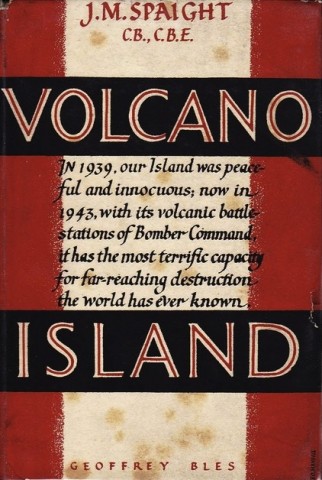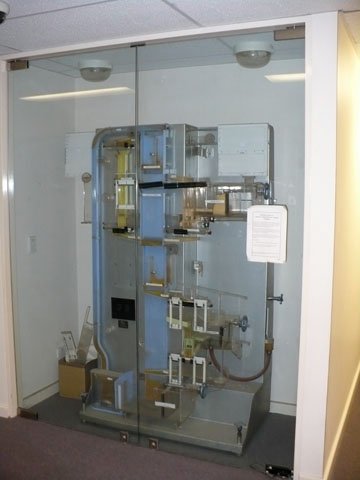J. M. Spaight was a lawyer by training and a civil servant by profession, and as was such not generally prone to flights of fancy. His prewar books are scholarly and judicious compilations of various opinions and precedents regarding aerial warfare. But his wartime writing, such as The Sky’s the Limit (1940) and Bombing Vindicated (1944), was much more populist, even propagandist, in tone (while never quite dispensing with the references, for which I am grateful). Volcano Island (1943) seems to have taken him the farthest from his comfort zone, if only in the striking, if overwrought, framing device: Britain as a volcanic island with Bomber Command’s airfields as volcanoes (with more than a touch of Old Testament wrath in there as well):
War came to it [Britain], war horrible and overwhelming. Enemies rose up against it. The men of the evil cities which forge the arms of destruction encompassed it. Its freedom and its very existence were threatened.
Then it was that its inhabitants made their great decision. Those forges of Satan, they said, must be destroyed. But how? One way only seemed to be possible. It was the way of Vulcan. They would call Vulcan to their aid — Vulcan who was not only the maker of arms but the master-builder of volcanoes. Volcanoes, they knew, do something more than send forth streams of lava and clouds of steam. They hurl molten blocks far and wide — blocks that are called volcanic bombs. They noted the word. It was their inspiration. They would make their island volcanic. From it should be hurled the bombs that would strike their assailants down.1
Fortunately Spaight doesn’t go on like this for the whole book. Instead he looks at various aspects of the bomber offensive against Germany as of late 1942 (he alludes to Torch and El Alamein in one place but clearly the bulk of the text was written in September-October that year). As this was a critical phase of the bomber war, with Bomber Command starting to find its feet and regain its confidence, and the USAAF just beginning to make its own contributions, so it’s worth having a look at how Spaight chose to portray (and promote) it to the reading public.
Surprisingly, given that the book itself is a work of boosterism, the first chapter is entitled ‘The penalty of boosting’. But it’s probably necessary, at that. Spaight admits that Britain’s aerial offensive against Germany in 1940 and early 1941 was almost completely ineffective, completely contrary to the claims made by the Air Ministry at the time. Simply put,
No country whose industries had been hammered as we supposed Germany’s had been could possibly have mounted and maintained the vast offensive which she launched on 22 June, 1941. If the British raids had been as damaging as they were imagined to be she could never have smashed her way to the gates of Moscow and Leningrad, meanwhile pressing back the Soviet armies all along the fifteen-hundred-mile front.2
Spaight notes particularly claims made by Sir Archibald Sinclair, the Air Minister, and Hugh Dalton, the Minister of Economic Warfare, as early as July 1940 claiming that damage to the German oil industry had been ‘very heavy indeed’ and ‘devastating’3 But as a January 1942 article in Aeronautics in January 1942 (apparently reprinted from Petroleum Times) pointed out, if it had been so successful then why did reports of raids on oil targets virtually cease in 1941? The conclusion was ‘that the oil offensive had been found to be less profitable than it was expected to be’.4
Spaight believes that the exaggerated claims for Bomber Command’s success were made in good faith, but that ‘there was a certain amount of wishful thinking’ going on.5 He identifies several reasons for this. One was simply that ‘the bomb-loads which were carried into Germany at that time were incapable of doing any serious amount of damage. They were puny by present standards’.6 Another was that ‘pilots and air crews were taken in on some occasions by the devices which the Germans had staged for their mystification’.5 These included fake bridges and railway stations, hiding major city streets with netting or by painting them green, and, especially, decoy fires to lure bomber crews away from real targets. He also notes that oil refineries are not as easy to destroy as might be thought, since the individual tanks tended to be well away from each other. These are fair points, though I suspect he overstates considerably the effectiveness of German decoys. Notably, he doesn’t blame Bomber Command’s training and doctrine, referring at one point to ‘the unequalled skill of the average R.A.F. bomber crew’.6 Of course, it would have been difficult, if not impossible, to make such criticisms in public in wartime.
Spaight allows that the exaggerated claims made for the bomber offensive was not necessarily all bad:
Perhaps the failure of the Luftwaffe to affect British morale was due is some degree to the belief that that the Royal Air Force were hitting Germany as hard as she was hitting Britain. To that extent the communiqués and Ministerial statements served a useful purpose; they helped the people to bear with fortitude the buffetings which they endured in the winter of 1940-41.7
But even so, Spaight argues that even so they were counterproductive in that they risked disillusionment with strategic bombing as people began to realise that reality was not matching the propaganda. This point, he suggests, was reached early in 1942, in parliamentary debates in February and March 1942 and subsequent attacks on bombing policy in the press (partly since the war situation was particularly grim then, after the fall of Singapore and the Channel Dash). Luckily for Bomber Command there then followed Billancourt, Lübeck, Rostock, and Cologne.
There’s quite a lot to be teased out of Volcano Island so I’ll be back with more, beginning with area bombing.
![]() This work is licensed under a Creative Commons Attribution-NonCommercial-NoDerivatives 4.0 International License.
Permissions beyond the scope of this license may be available at http://airminded.org/copyright/.
This work is licensed under a Creative Commons Attribution-NonCommercial-NoDerivatives 4.0 International License.
Permissions beyond the scope of this license may be available at http://airminded.org/copyright/.





Pingback: Volcanic warfare — II